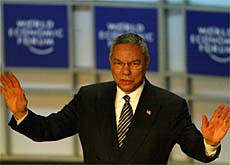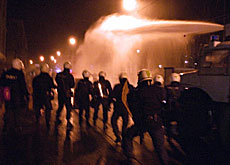Couchepin: Powell’s speech won’t sway anti-war mood

Colin Powell's latest call for military action against Iraq - issued in Davos on Sunday - was not enough to sway anti-war sentiment, the Swiss president Pascal Couchepin said.
But in his reaction to the US secretary of state’s much anticipated speech, Couchepin told swissinfo it was “very good”.
“He is a great speaker. But there is naturally nothing new, with the exception of his emphasis [on the need for military action],” Couchepin said.
Asked whether it would help convince America’s doubters, Couchepin said: “No, surely not”.
“But it is a good confirmation of the view of Americans.”
Powell’s speech, delivered to more than 2,000 global business and political leaders, was a forceful call for action against Iraq, and again emphasised US willingness to act “against Iraq alone, or in a coalition of the willing”.
“We are in no great rush to judgment today or tomorrow, but it is clear that time is running out,” Powell said.
No need for “smoking guns”
Powell also stressed that Washington was determined to disarm Iraq by force, with or without U.N. backing, if Baghdad did not surrender its arms and document their destruction voluntarily.
“This is not about inspectors finding smoking guns,” Powell said. “It is about Iraq’s failure to tell the inspectors where to find its weapons of mass terror.”
Powell’s speech remains a high point of this year’s WEF summit in the Swiss mountain resort – which has been overshadowed by the prospect of a war in Iraq.
Observers to this year’s gathering have been stunned by the level of anti-American sentiment that has infused many of the discussions in Davos.
Attended by many of Europe’s most influential business and political leaders, the summit has also reflected a general European – and Swiss – unease with US plans in Iraq.
In that sense, Powell’s speech – and subsequent question-and-answer session – was an important opportunity for the Bush administration to state its case in person.
The “troubled partnership”
Powell said disagreements between Europe and the US were nothing new.
“Differences are inevitable. But differences should not be equated with American unilateralism or arrogance,” he said.
However, he reminded WEF participants that the US had rescued Europe “from the tyranny of fascism”, and helped “Europe regain its vitality”.
Powell said the US had shown time-and-time again that it deserved the trust of its allies over its pursuit of the Iraqi president Saddam Hussein.
“You can trust us on that.”
Life or death
He also listed a series of questions about Iraq’s weapons programme, such as the fate of 30,000 potential chemical warheads, or the whereabouts of three tonnes of base material for the production of deadly biological agents.
“These questions are not academic or trivial. These are questions of life or death,” Powell said.
Several debates in Davos have focussed on the question of whether the US should be trusted to use its huge political, economic and military power wisely.
Couchepin applauded Powell’s defence of America’s willingness to mix so-called “hard-power” (the use of military force), with “soft-power” (diplomacy and dialogue).
“It is always true that the US always mixed the use of soft-power and hard-power… but it was said excellently,” Couchepin said.
swissinfo, Jacob Greber, special correspondent in Davos
The American secretary of state, Colin Powell, made a speech defending US policy on Iraq at the World Economic Forum summit in Davos.
He indicated that time was running out for Iraq, and that the US would use force if Baghdad didn’t surrender or destroy its arms soon.
Swiss President, Pascal Couchepin, said the speech was well delivered, but that it failed to sway the general anti-war sentiment among the delegates.
This year’s conference has been dominated by anti-US sentiment and unease over Washington’s policies on Iraq.

In compliance with the JTI standards
More: SWI swissinfo.ch certified by the Journalism Trust Initiative










You can find an overview of ongoing debates with our journalists here . Please join us!
If you want to start a conversation about a topic raised in this article or want to report factual errors, email us at english@swissinfo.ch.